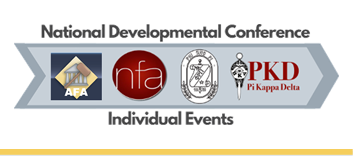Document Type
Education/Competitive Duality
Abstract
Recent years have seen a trend toward the inclusion and heightened valuing of research questions in competitive Rhetorical Criticism (Communication Analysis). The inclusion of this content element is quite a new phenomenon on the national-level competitive circuit. In fact, the absence of such research questions in competitive speeches was highlighted by Ott as recently as 1998. But by 2007-2008, the inclusion of a research question was established as essentially de rigueur for a vast number of judges. For example, consider the ballots received this past year by a competitively successful rhetorical criticism entry I coached. At one tournament, all five ballots written in response to this speech (2 in Prelims, 3 in Finals) wrote the research question at the very top of the ballot. For four of the five judges, their assessment of the handling of this question was clearly central to the scores they assigned. Three questioned the quality of the question: (1) "this is a big question to ask based on this one incident," (2) "Islamaphobia: relevant, but a bit out of the public consciousness (for a while now)," and (3) "your research question needs clearer, specific focus – you could apply it to many artifacts. How can you focus the question on this specific artifact?" The fourth judge meanwhile focused on the adequacy of the question‟s answer, stating that the response needed to be "extended." Ballot comments about this speech‟s research question continued throughout the year – requiring this aspect of the speech to be the single most frequently rewritten and rethought aspect of the speech across the length of the competitive season.
To borrow language from many Persuasive speakers, "this is not an isolated incident." As both a coach and a frequent tab-room worker, I have read innumerable ballots written by critics judging this event. Research questions have clearly become a crucial component in many judging paradigms. Given the precipitous rise of this speech component, it is important that we assess the nature and worth of emphasizing research questions in competitive rhetorical criticism. In order to do so, we will: first, establish a philosophical perspective from which to answer the question (we will privilege the vision of forensics as an "educational liberal art"); second, speculate about the reasons why this element has so quickly gained favor among judges; third, assess the degree to which this element meshes with other required elements of competitive speeches in this category; and fourth and finally, propose a paradigm shift.
Creative Commons License

This work is licensed under a Creative Commons Attribution 4.0 International License.
Rights Statement
In Copyright https://rightsstatements.org/page/InC/1.0/?language=en
Recommended Citation
Paine, Richard E.
(2008)
"New Wine in Old Wineskins: Questioning the Value of Research Questions in Rhetorical Criticism,"
Proceedings of the National Developmental Conference on Individual Events: Vol. 4:
Iss.
1, Article 25.
Available at:
https://cornerstone.lib.mnsu.edu/ndcieproceedings/vol4/iss1/25

